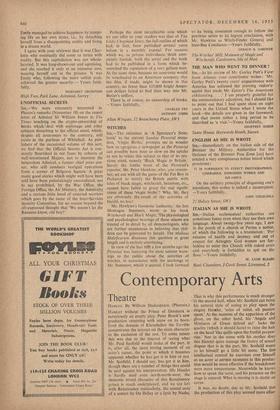UNOFFICIAL SECRETS
SIR,—We were extremely interested in Pharos's remarks (November 18) on the recent letter of Admiral Sir William James in The Times touching on the crypto-censorship of books which' deal with espionage and other subjects disturbing to the official mind, which, despite all assurances to the contrary, still exists in the purlieus of Whitehall. As pub- lishers of the occasional volume of this sort, we find that the Official Secrets Act is con- stantly flourished in our faces by cohorts of well-intentioned Majors, not to mention the benevolent Admiral, a former chief press cen- sor, who still conducts vestigial operations from a corner of Belgrave Square. A great many good stories which might well have been told have been painstakingly emasculated, not to say prohibited, by the War Office, the Foreign Office, the Air Ministry, the Admiralty and a curious little band of assorted warriors which goes by the name of the Inter-Services Security Committee, for no reason beyond the oft-expressed thought that 'We mustn't let the ,Russians know, old boy!' Perhaps the most inexplicable case which we can offer to your readers was that of The Eddie Chapman Story, the full outline of which had, in fact, been published several years before in a monthly journal. For reasons which we, as private individuals, 'think com- pletely foolish, both the serial and the book had to be published in a form which be- smirched the reputation of a very gallant man. At the same time, 'because no assurance would be 'vouchsafed to an American company that the film, if made, might be shown in this country, no fewer than 135,000 bright Ameri- can. dollars failed to find their way into Mr. Butler's coffers.
There is, of course, no censorship of books. —Yours faithfully,


































 Previous page
Previous page